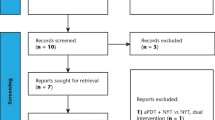Abstract
Data sources
The Cochrane database of systematic reviews, the Cochrane Central Register of Controlled Trials (CENTRAL), Medline and Embase databases and reference lists of identified articles were searched with no language restriction.
Study selection
Randomised controlled trials that compared the efficacy of antifungal medications with other treatments of denture-related erythematous stomatitis in adults wearing conventional acrylic removable complete dentures were included. Trials of seven days or fewer were excluded.
Data extraction and synthesis
Study assessment and data extraction were carried out independently by at least two reviewers. Study quality was assessed using Cochrane methodology. Odds Ratios (OR) and 95% Confidence Interval (CI) were calculated to compare results across studies using a random effects model.
Results
Fourteen randomised controlled trials were included in the review, with eight studies contributing to the meta-analysis. No statistically significant difference between antifungal treatment and disinfection methods was found for both clinical and microbiological outcomes. Meta-analysis showed a statistically significant difference between an antifungal and a placebo for the microbiological outcome (OR=0.32; 95% CI: 0.12−0.89; Z=−2.2; p=0.028), favouring the antifungals. There was no statistically significant difference between antifungal and placebo for the clinical outcome (OR=0.2; 95% CI: 0.04−1.04; Z=−1.9; p=0.056).
Conclusions
The findings of this review and meta-analysis suggest that disinfection methods could be considered as an adjunct or alternative to antifungal medications in the treatment of denture stomatitis.
Similar content being viewed by others
Commentary
Denture stomatitis is a common, erythematous, inflammatory reaction of the oral mucosa contacting removable prostheses. It is commonly attributed to the fungus Candida albicans, which colonises dentures and contacting mucosal surfaces, triggering an inflammatory response. Therefore, antifungal agents are often used to treat denture stomatitis, although other methods including changes in denture-wearing patterns, and denture cleaning/disinfection are also used.
Emami et al. conducted a systematic review, with meta-analysis, of RCTs comparing antifungal medications with other treatments for denture stomatitis.
The authors found no statistically significant difference between antifungals and broad-spectrum disinfection methods for both clinical and microbiological outcomes. Surprisingly, there was no significant difference between antifungals and placebo for clinical outcomes.
The procedures used were robust, including assessment of study quality using Cochrane methodology. However, the following factors should be taken into consideration in interpreting the results:
-
The antifungal medication group included studies testing different antifungal medications (nystatin, miconazole, amphotericin B, fluconazole) with varying delivery mechanisms (rinse, incorporation into denture adhesive or tissue conditioner, lozenges, capsules). Since these medications differ in potency and the delivery route also affects efficacy, grouping these studies together may not present an accurate picture.
-
Similarly, the disinfection methods group included studies testing disinfecting agents, natural substances with antimicrobial properties, microwave treatment, photodynamic therapy and use of antiseptic mouthwashes. Some of these modalities may be more effective than others.
-
Wearing dentures all the time is strongly associated with denture stomatitis, and removal overnight can result in amelioration of symptoms. The studies examined included varying instructions to patients ranging from no alteration in prior habits to specific guidelines on denture use. This can confound interpretation of the results.
-
As mentioned by Emami et al, the reviewed trials were of varying quality. The majority of studies did not report blinding of examiners, and on dropouts and withdrawals. No trial used intention-to-treat analyses.
A systematic review by Skupien et al.1 examined studies of methods to prevent or treat Candida infection in denture liners or tissue conditioners. Three in vivo studies supported the efficacy of nystatin to treat denture stomatitis.
Other studies supported the efficacy of sodium hypochlorite in disinfecting denture liners.
The results of these studies are not entirely surprising. Although presence of C. albicans is required for the development of this infection, it is increasingly appreciated that denture stomatitis is a mixed fungal-bacterial biofilm-induced disease. In fact co-aggregation of Candida with oral bacteria is common in denture biofilms in humans,2 and in animal models of denture stomatitis.3,4 Commensal bacterial species can contribute to mucosal inflammation triggered by C. albicans.5
Consequently, broad spectrum anti-infective agents would be expected to have at least the same efficacy, if not better, as anti-fungals in the resolution of this infection. Thus, following the current American College of Prosthodontists' guidelines,6 recommending daily removal of the polymicrobial biofilm from dentures to prevent denture stomatitis, is critical in the control of this infection.
References
Skupien JA, Valentini F, Boscato N, Pereira-Cenci T . Prevention and treatment of Candida colonization on denture liners: a systematic review. J Prosthet Dent 2013; 110:356–362.
Campos MS, Marchini L, Bernardes LA, Paulino LC, Nobrega FG . Biofilm microbial communities of denture stomatitis. Oral Microbiol Immunol 23:419–424.
Nett JE, Marchillo K, Spiegel CA, Andes DR . Development and validation of an in vivo Candida albicans biofilm denture model. Infect Immun 2010; 78:3650–3659.
Johnson CC, Yu A, Lee H . Fidel PL Jr, Noverr MC . Development of a contemporary animal model of Candida albicans-associated denture stomatitis using a novel intraoral denture system. Infect Immun 2012; 80:1736–1743.
Xu H, Sobue T, Thompson A, et al. Streptococcal co-infection augments Candida pathogenicity by amplifying the mucosal inflammatory response. Cell Microbiol 2014; 16:214–231.
Felton D, Cooper L, Duqum I, et al.; Academy of General Dentistry; American Dental Association Council on Scientific Affairs; American Dental Hygienists' Association; National Association of Dental Laboratories; GlaxoSmithKline Consumer Healthcare. Evidence-based guidelines for the care and maintenance of complete dentures: a publication of the American College of Prosthodontists. J Am Dent Assoc 2011; 142:1S–20S.
Author information
Authors and Affiliations
Additional information
Address for correspondence: Elham Emami, Oral Health and Rehabilitation Research Unit, Faculté de Médecine Dentaire, Université de Montréal, C.P. 6128, succ. Centre-ville, Montréal (QC), Canada H3C 3J7. E-mail: elham.emami@umontreal.ca
Emami E, Kabawat M, Rompre PH, Feine JS. Linking evidence to treatment for denture stomatitis: a meta-analysis of randomized controlled trials. J Dent 2014; 42: 99-106.
Rights and permissions
About this article
Cite this article
Lalla, R., Dongari-Bagtzoglou, A. Antifungal medications or disinfectants for denture stomatitis. Evid Based Dent 15, 61–62 (2014). https://doi.org/10.1038/sj.ebd.6401032
Published:
Issue Date:
DOI: https://doi.org/10.1038/sj.ebd.6401032



